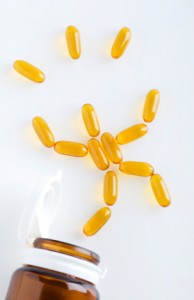It seems like fish oil will cure anything that ails ya’ these days. And in some ways, it can – here’s how it works.
Inflammation, the current health buzzword, is both the cause of many health problems and the result of many health problems, causing more problems. Inflammation is part of the natural healing process, but can get out of whack when we don’t have all the nutrients we need to resolve the process. We get stuck in a kind of emergency state, and the day-to-day operations can falter. Resulting in chronic inflammation.
The types of fats we eat influence our inflammation, because omega-3 fats are necessary for the resolution phase of inflammation, and omega-6 fats are necessary for the start-up phase of inflammation. And we are getting way too many of these omega-6 fats in the form of vegetable oils and processed foods, and way too few of the omega-3 fats, which are found in fatty fish, flax nut/seed oils. So inflammation gets started but not finished, leaving us feeling less than our best and contributing to cardiovascular disease, diabetes, obesity, cancer, etc.
What does this have to do with depression, you ask? Here’s the longish but oh so interesting answer.
Each cell is surrounded by a membrane, made up mostly of fats along with some proteins. This barrier uses the oil and water don’t mix principle to keep cells intact in our watery bodies. The membrane of each cell is not just a fence keeping the inside parts of the cell together – it actively decides what gets let in and out, kind of like those bouncers at the door of a hot new night club. Complex neurotransmitter signals and reactions open the membrane, allowing it to activate transporters which bring in what the cells need. Or not.
Just like every nightclub needs pretty young things to make it cool and hip, our cells need pretty young nutrients to stay in business.
Interestingly, the type of fats we have in the cell membrane also determine its flexibility – saturated fats are not flexible, and too many of them can make cell membranes too stiff. Trans fats make our cell membranes unable to work properly at all, which is why eating them contributes to so many diseases. So, omega-3s are the Justin Timberlake/Katy Perry hotties, while trans fats are the creepy old guys with the hairpiece and polyester suit.
Inflammation causes the cell membranes to become too stiff, so the transporters can’t do their jobs. In the brain, this means that serotonin, and tryptophan (which our bodies use to make serotonin) can’t get into our cells. Serotonin is necessary for mood regulation, and a lack of it contributes to depression.
To bring it around, adding omega-3 fats in the form of fish oils can reduce the inflammation response in the membranes of our brain cells, allowing more serotonin and tryptophan into our brains. Which can lead to a better mood. As my family will tell you, more serotonin is good, especially for Mama. As long as I don’t dance in public.
This is a simplistic explanation of omega-3 fats and inflammation, but it gives you the general idea of what is going on inside our heads. So, like I always say, we take vitamins to make us feel better, and here’s another way those fish oils (or krill oil) can help us feel better. Start with a quality supplement that delivers 1,000 mg/1 gram a day of EPA and DHA (the best omega-3 part of the oils), higher EPA than DHA has been shown to be best for the brain. Of course, if your physician has you on a higher dose, go with that.
How do you know a quality supplement? It will have a USP label and clearly state that the oil has been purified and is free of mercury and other contaminants. And the EPA/DHA amounts will be clearly listed. If they give you fishy burps, keep them in the freezer or take them at night.
So, there you go, more incentive to take those fish oils your doctor recommends. If you eat fatty fish like salmon and mackerel at least 3 times a week, and eat at least an ounce of walnuts and pumpkin seeds every day, you may not need a supplement – just be honest with yourself about what you really eat. This is one case where a little extra doesn’t hurt, and may really help.
Note: This post is for information purposes only – if you are currently being treated for depression or are seeking help for depression please discuss this with your physician. I am not a doctor, just a nutritionist.

Leave a Reply